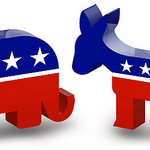The argument that partyism has surpassed racism is pretty week.* But I do believe “partyism” is a possible problem, one with experienced by the masses and largely caused by elite behavior.
For the masses, partyism keeps us from talking about specifics in ways that might promote understanding and compromise. If our go-to position regarding those with other party labels is mistrust or full on loathing, we’re not likely to have productive conversations with those who don’t share our priorities. Especially because our current partisan alignments are more a product of history than a ‘natural’ configuration, losing the ability to talk across party lines is a significant blow to a well-informed electorate and good government. (In fact, that concern is one of the primary motivations this blog.) Also, if like me (and Matthew Dickinson) you believe that the American people actually remain relatively moderate on policy while the parties sell division, this takes on even more urgency.
At the elite level, factors contributing to partyism are more complicated. Whether we wish for more bipartisan cooperation probably depends more on what you expect the outcome would be than on any intrinsic value we place on bipartisanship. Nor should we be surprised that we don’t see much cooperation more often. And not because campaigns have grown measurably more contentious (the ‘Founding Fathers’ were awful to each other).
The ideological alignment of our current parties makes cross-party cooperation even less likely than it once was. It was one thing for conservative Southern Democrats to side with conservative Northern Republicans in the half-century after the Great Depression.** Shared priorities could trump ideology, especially with some geographic distance. But in our era the most conservative Democrat is more liberal than the most liberal of his Republican colleagues, in either house of congress. So partyism is reinforced by ideology (often accompanied by differences in race, ethnicity, gender, and culture).
Then there’s another elite: the media. One hundred senators can figure out how to be collegial enough to work on shared priorities, even if the nation is divided. But media corporations and personalities make their money by playing up and playing off of partyism. I don’t know whether they are getting better at it or whether we’re just getting more receptive. Our increased ability to choose only partisan-leaning media sources certainly isn’t helpful.
So, a party-ideology alignment, a partisan media, and the technology to create our own media bubbles all contribute (along with other factors) to diminish common feelings across party lines. That’s both a tragedy and a danger.
* I have some serious issues with the polling Sunstein sites. Polling on bias is problematic because (a) people are cautious about what they say, even anonymously, and (b) we are poor at judging the actual causes of our (hypothetical) responses. As for the study of partysim, this has the usual challenges of measuring an abstract concept with non-lifelike tests. No one actually plays out these biases through a computer speed click test. Finally, the findings on race are suspicious (whites favoring African-American job candidates, race not impacting the trust game), increasing doubt about their other findings.
** This is my favorite example that ‘bipartisanship’ isn’t always so good. That cross-party cooperation of conservatives helped stall progress on civil rights and ensured that racial discrimination will remain central to American law and public policy for decades to come.
Latest posts by Jason LaBau (see all)
- Take Down the Confederate Monuments - August 14, 2017
- The Democratic Split - August 10, 2015
- On Lincoln and Our Second Founding - July 6, 2015

